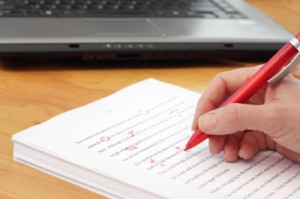Working With An Editor
All authors need an editor. Self-published authors should not publish a manuscript without hiring a competent editor to improve and polish it.
For the purposes of this post, an editor is someone who suggests changes in overall plot, setting, characters and theme. I am not talking about a copy-editor (although copy-editors are important too).
Before I started writing fiction, I had written many non-fiction articles. I mistakenly thought fiction would be easier. The first draft of my debut novel, Emily’s Hope, was so bad that when I gave part of it to my kind (and honest) husband to read, his response was, “You’re not going to let anyone read this, are you?”
Admittedly, I was crushed. I hired an editor and over the next two years, she helped me to take a badly written first draft and transform it into a much better novel. She helped me not only to improve my writing style, but to also create a convincing narrative voice.
Here are a few key points to remember when working with an editor:
Be Humble: If you think your book is going to be a Nobel prize-winning book or that it’s the best book ever written, well, it probably isn’t, not yet anyway. It may have the potential of being a great book but, generally speaking, most books need a lot of polishing and editing to get it to the stage of being “great.”
Like many authors, I spend more time polishing and editing than I do actually writing the first draft.
Consider and Reflect on Each Criticism/Suggestion: It may take hours or days of reflection to realize that most of the editor’s ideas will actually make the book better.
Authors tend to be blind to the defects in our own works. Some of us can be rigid with regard to what we want the story or characters to be. For example, in my second novel In Name Only,, the first draft was entirely from the main female character’s point of view (POV).
The editor said that she understood why I chose that particular POV, but either I needed to include the major male characters’ POVs or find another way for the reader to understand and bond with the male characters better.
I initially rejected the idea of including the male characters’ POVs. Then as time passed and, as I reflected, I admitted that she might be right. As it turned out, writing from a male POV was also great fun. This novel went on to win a Gold medal in the IPPY awards and is currently is an Amazon Kindle top five bestseller in Religious & Liturgical Drama.
Resist the Urge to be Defensive: This is where I have the most trouble. Then again, that’s probably my personality. Even now, when I read my editor’s suggested changes, I have to resist the urge to be defensive.
You Don’t Have to Agree with Everything: Sometimes, the editor will suggest changes the author is reluctant to make. If, after reflection, you still feel strongly about keeping things the same, talk it over with the editor. I find I usually agree with about 85 percent of the suggested edits and I disregard the rest.
Keep in mind that your editor is not being paid to be nice or to make you feel good; he or she is being paid to make your book a quality book.
Trust Your Editor: If you don’t trust your editor, you should probably find another editor.
Working with an editor can be a challenging experience. However, if you exercise humility, consider and reflect on each edit, be open to change, resist the urge to be defensive and trust your editor, you will hopefully produce a great quality book.
Text Copyright 2012 Ellen Gable Hrkach
Image purchased from iStock.
- Strengthen Your Lenten Journey With Fasting - February 19, 2016
- From the President’s Desk – Success, Faithfulness and Farewell - November 27, 2015
- From the President’s Desk – World Meeting Recap - October 23, 2015



Good points. I’m working with my first editor (on my first novel). It has been quite helpful. Thanks for your input.
You’re welcome, Kathy. Glad it was helpful…